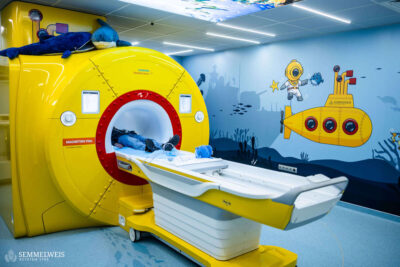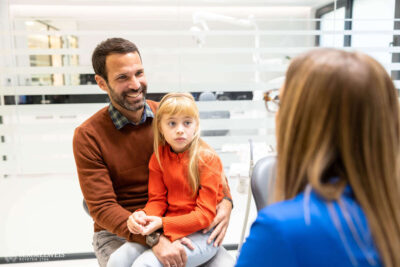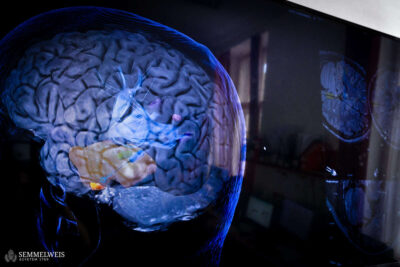Approximately 150,000 couples in Hungary struggle with infertility, with one in six to seven married couples finding it difficult to have children. This rate is in line with the international average, with 10-15 percent of the world’s reproductive population affected, and rising by 0.3-0.4 percent per year. In the past, it was thought that there were internal, psychological conflicts that caused infertility, but according to the present state of knowledge this is not the case, underlined clinical psychologist Dr. Judit Szigeti F. We now think of these as contributing factors at most, and only chronic stress is proven to be able to contribute to infertility, but it cannot be the cause in itself. If, on the other hand, a couple reaches the point where they are still trying in vain to have a child after a year, then the fact that they are experiencing stress can be proven. Our job is to manage this infertility-related stress, she explained.
Dr. Miklós Sipos, Director of the ARC, stressed that age was a very important factor for successful IVF (in vitro fertilization, that is, fertilization outside of the human body): Under 40 years of age, in couples who are properly screened and medically well prepared, there is a 40 percent chance of the first treatment being successful. However, couples over 40, with the woman having a depleted ovary or even severe endometriosis, or with the man experiencing serious problems, may fail to conceive despite several attempts. As Dr. Miklós Sipos emphasized:
So, we can say that we can now help those who turn to us at a reasonable age and have a biological chance of having a child more and more quickly.
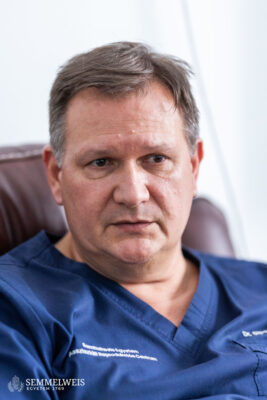 Speaking of psychological factors, he added that although it was indeed not possible to identify stress as a scientifically detectable pathological factor, in their experience it was relatively common for a couple to seek help after years of failure, attend a consultation, determine the course of the medical examination and treatment, and then go home and conceive spontaneously.
Speaking of psychological factors, he added that although it was indeed not possible to identify stress as a scientifically detectable pathological factor, in their experience it was relatively common for a couple to seek help after years of failure, attend a consultation, determine the course of the medical examination and treatment, and then go home and conceive spontaneously.
During the restrictions imposed by the COVID-19 pandemic, male members of couples were sidelined during treatment and for years were not allowed to enter the infertility center except for their own tests. At most, they could attend consultations via some form of telemedicine. They were therefore left out of the treatment of the couple’s reproductive difficulties, which caused serious psychological damage on the male side. At the ARC, now that the pandemic is over, special attention is paid to ensuring that couples are together throughout the treatment, if possible, and discuss any issues that arise.
Dr. Judit Szigeti F. said that the ARC was the first – but by now not the only – infertility center in Hungary with a psychologist in full-time employment, and where everyone who needed it was assessed with a questionnaire from a psychological point of view. This questionnaire, recently validated on a large sample, reveals the emotional state of the person compared to the average infertility sufferer, who then receives targeted help in case of higher-than-average stress. Firstly, we offer therapy in group format, which can be very effective, as it can make the person feel that they are not alone with their problems. Those whose treatment is not effective enough in group therapy can receive individual therapy, said Dr. Judit Szigeti F.
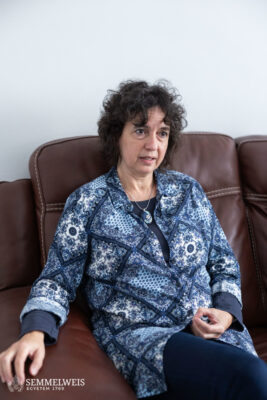 Dr. Judit Szigeti F. and her colleagues have recently published the results of a randomized controlled clinical trial. The aim of the study was to adapt the American Mind/Body Program for Infertility – which had been proven to be effective – in Hungary and to provide an impact analysis of it. Within the framework of this ARC study, 880 people completed the questionnaire, of whom 150 were included in the study. Participants received 10 weeks of complex group therapy using a method developed in the United States, which included dietary advice and exercise. The method is still in use at the center after the study ended. The supportive environment is a very important factor in group therapy, stressed Dr. Judit Szigeti F. Other important elements of the program are the learning of relaxation techniques and the handling of difficult social situations related to infertility, she pointed out.
Dr. Judit Szigeti F. and her colleagues have recently published the results of a randomized controlled clinical trial. The aim of the study was to adapt the American Mind/Body Program for Infertility – which had been proven to be effective – in Hungary and to provide an impact analysis of it. Within the framework of this ARC study, 880 people completed the questionnaire, of whom 150 were included in the study. Participants received 10 weeks of complex group therapy using a method developed in the United States, which included dietary advice and exercise. The method is still in use at the center after the study ended. The supportive environment is a very important factor in group therapy, stressed Dr. Judit Szigeti F. Other important elements of the program are the learning of relaxation techniques and the handling of difficult social situations related to infertility, she pointed out.
Research shows that people who receive psychological support have at least a 10 percent higher chance of becoming pregnant than those who do not.
Both Dr. Miklós Sipos and Dr. Judit Szigeti F. believe it is important for couples to be properly informed about their fertility options. They always try to exploit all their options and leave it up to the couple to decide how far they want to go. Dr. Miklós Sipos concluded by saying that successful IVF was the result of a joint effort: On the side of the attending physician, knowledge and technology were necessary, and on the side of the patient, a healthy lifestyle, optimized body weight, and adopting the right mindset.
Eszter Keresztes
Translation: Dr. Balázs Csizmadia
Photos by Bálint Barta – Semmelweis University
